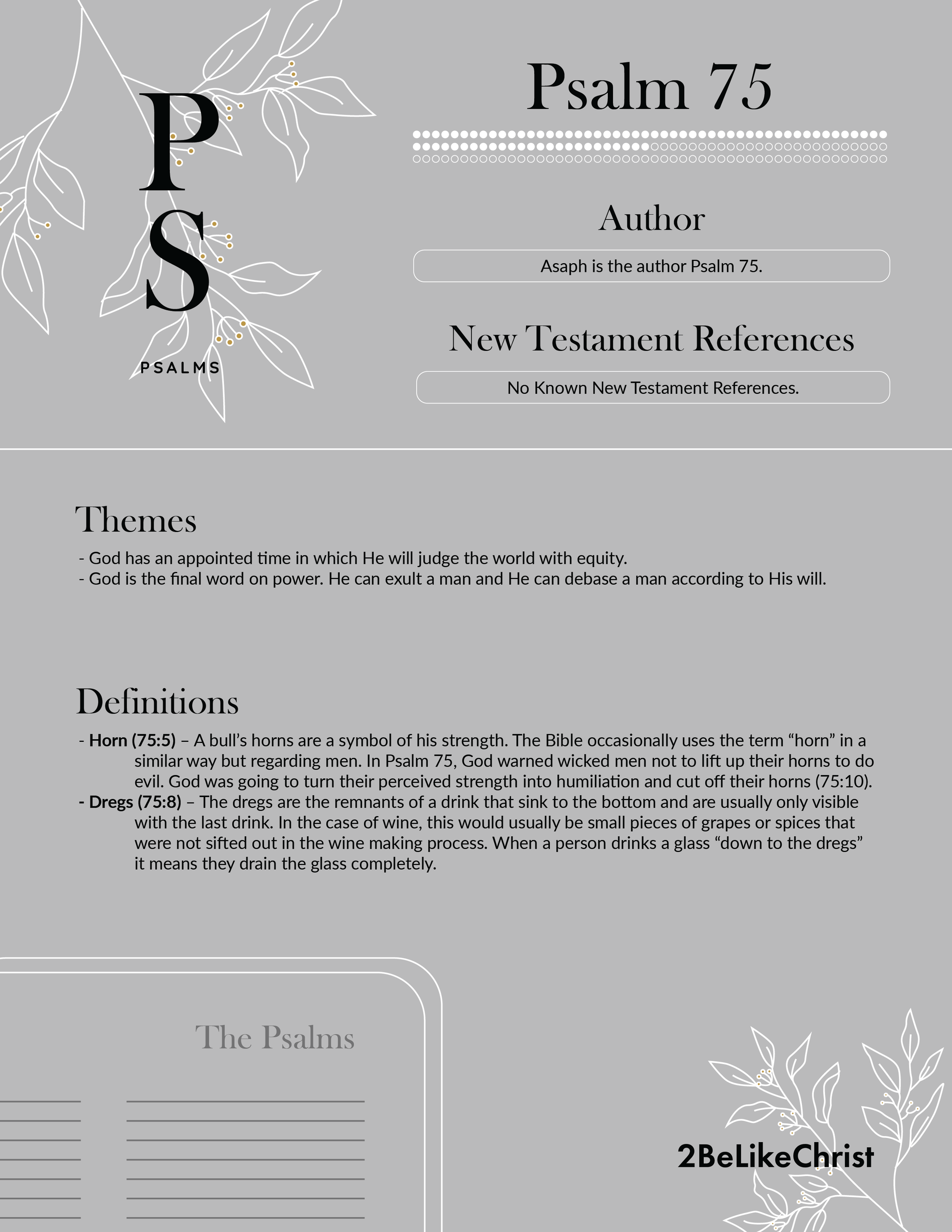Psalm 75 Summary - 5 Minute Bible Study
Psalm 75 Short Summary:
Psalm 75 extolls God’s fairness and equity in judgement. God has appointed a time in which He will judge all men. He will exalt the righteous and those who trust in Him. In contrast, he will debase the proud and make them drink from the foaming cup of His wrath (Psalm 75:8).
Psalm 75 Summary
AUTHOR:
Asaph is the author Psalm 75.
NEW TESTAMENT REFERENCES:
No Known New Testament References.
THEMES:
God has an appointed time in which He will judge the world with equity.
God is the final word on power. He can exult a man and He can debase a man according to His will.
DEFINITIONS:
Horn (75:5) – A bull’s horns are a symbol of his strength. The Bible occasionally uses the term “horn” in a similar way but regarding men. In Psalm 75, God warned wicked men not to lift up their horns to do evil. God was going to turn their perceived strength into humiliation and cut off their horns (75:10).
Dregs (75:8) – The dregs are the remnants of a drink that sink to the bottom and are usually only visible with the last drink. In the case of wine, this would usually be small pieces of grapes or spices that were not sifted out in the wine making process. When a person drinks a glass “down to the dregs” it means they drain the glass completely.
OUTLINE:
GOD’S FAIR JUDGEMENT AND HIS CUP OF FOAMING WINE (75:1-10):
Asaph opens Psalm 75 giving worship to God for His “wondrous deeds,” and follows this up by quoting God.
God said, “At the set time that I appoint I will judge with equity. When the earth totters, and all its inhabitants, it is I who keep steady its pillars. Selah. I say to the boastful, ‘Do not boast,’ and to the wicked, ‘Do not lift up your horn; do not lift up your horn on high, or speak with haughty neck’” (75:2-5).
In this text, we see a promise, a reassurance, and a warning.
The promise is that God will judge all men, the wicked and the righteous alike, and He will do it fairly (with equity).
The reassurance is that when things on earth seem shaky and unstable, God is the steadying force that keeps everything from falling apart. He will not allow corrupt men to ruin what He intends to sustain.
The warning was directed towards corrupt men who wanted to exalt themselves in pride and flex their perceived strength, which was really a delusion.
The psalmist knew that strength wasn’t achieved through the might of men, but through the power of God.
“It is God who executes judgment, putting down one and lifting up another” (75:7).
Verse 8 contains an interesting illustration, picturing God holding a cup of foaming wine.
God was going to make the wicked drink the entire glass, all the way down to the dregs, and it would seal their fate.
Albert Barnes writes this in his commentary, “The true idea in the expression is probably that it [the wine] ferments; and the meaning may be that the wrath of God seems to boil like fermenting liquor.”
The haughty and corrupt were going to have to drink from the cup of God’s wrath.
Psalm 75 ends with Asaph worshiping God for His equitable judgement.
God was going to cut off the horns of the wicked and promote His faithful people.
APPLICATION:
Can you imagine God sitting the most powerful people in the world down at His table (presidents, billionaires, etc.) and forcing them to drink a glass of His wrath against their will.
In life, these people obeyed only themselves, they were rulers on earth, but God will sit them down like little children at the dinner table and make them finish what He puts in front of them.
All of us must drink from a cup, but God allows us to choose from which cup we drink.
God’s cup of wrath awaits those who refuse to submit to Him on earth.
But Jesus poured another cup for those who wish to drink from God’s grace.
“And He took bread, and when He had given thanks, He broke it and gave it to them, saying, “This is my body, which is given for you. Do this in remembrance of me.” And likewise the cup after they had eaten, saying, “This cup that is poured out for you is the new covenant in my blood” (Luke 22:19-20).
This text records Jesus instituting the Lord’s supper, which is a meal Jesus’ followers eat to remember His death.
The cup and its contents remind Jesus’ followers of His blood that He gave on the cross to forgive our sins.
This is a cup for humble people to drink. We drink to remember the humble Savior. We come to the table willingly to acknowledge our dependence on God.
You have a choice… Come to the table willingly to drink the sweet cup of God’s grace or be forced to the table to receive a very different drink.

